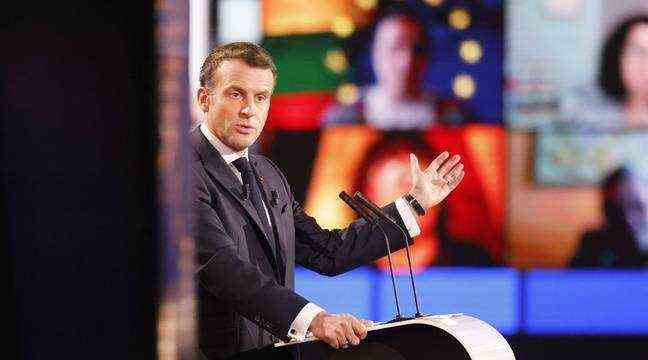Emmanuel Macron at the European Parliament in Strasbourg, May 9. – Jean-Francois Badias / AP / SIPA
- Emmanuel Macron was visiting Strasbourg on May 9, for Europe Day.
- He met the President of the European Parliament, David Sassoli, before attending the launch of the conference on the future of Europe. Then he went to the prefecture to sign a three-year contract with the local communities.
- In the Alsatian capital, the President of the Republic pleaded for a more agile European Union, deciding “faster and stronger”.
His visit this Sunday was not by chance. On this day in Europe, Emmanuel Macron had decided to come to Strasbourg. In a city that has not seen an MEP in its European Parliament since February 2020.
In the Alsatian capital, the President of the Republic pleaded for a more agile European Union, deciding “faster and stronger”, on the occasion of the launch of the Conference on the future of Europe, a vast citizen consultation . “Faced with authoritarianism, the only valid answer is the authority of democracy”, which “can only be won by efficiency and speed”, argued the Head of State from the sparse hemicycle of the European Parliament in Strasbourg, transformed for the occasion into a sort of television set.
“Our European democracy is a democracy of compromise, of balance, which is a virtue that we must protect, but it is also a weakness when it suffocates in its own procedures”, he acknowledged. For Emmanuel Macron, Europe must “decide faster and harder”, in particular to strengthen “the sovereignty” of the continent in strategic sectors such as health, while the EU has been strongly criticized for its management of the health crisis. .
The French President also took advantage of his presence in Strasbourg to underline before the heads of the European institutions the “living symbol” represented by this city in the history of European construction. “This is where the heart of European democracy beats”, he said, while the Strasbourg seat of the European Parliament has been deserted for a year and a half by MEPs because of the health crisis, in favor of Brussels and to the chagrin of France.
No return date in Strasbourg
The president of the institution, the Italian David Sassoli, declared “do not doubt (er) that the European Parliament will be able to return very soon to Strasbourg” but without advancing a date, while Emmanuel Macron hoped that the plenary session June marks its return to the Alsatian capital.
After kicking off the Conference on the Future of Europe, Emmanuel Macron also signed a three-year contract with local authorities to strengthen Strasbourg’s European dimension. Calling for “the return of major projects” and “great ambitions”, the French president stressed that this Conference represented “an unprecedented exercise” to “consider our future” in the next ten years.
Soon the rotating presidency
This democratic consultation, with an online platform which should allow European citizens to share their vision of the future of Europe and be supplemented in France by “citizens’ consultations”, should extend over a year and make its proposals at the time. where France will assume the rotating presidency of the EU. A calendar that is timely for the Head of State who intends to make this presidency of the EU an asset for the presidential election of May 2022.
Despite the bitter negotiations between institutions which have cast doubt on the EU’s desire to derive real political guidance from this whole process, Emmanuel Macron as well as the EU leaders assured on Sunday that they would take into account the proposals. citizens. This conference “should not remain an exercise centered in Brussels”, considered Portuguese Prime Minister Antonio Costa, whose country currently chairs the EU.
Several avenues for reform
The President of the European Parliament, the Italian David Sassoli, has already suggested several avenues of reform, pleading for a strengthening of the role of his institution with a right of initiative in legislative matters, like that of the national parliaments, and believing that citizens should be able to vote on the presidency of the European Commission. He also questioned the rule of unanimity in the Council, where the member states sit, arguing that it hindered decision-making and allowed “external geopolitical actors” to “take advantage of the divisions” between the Twenty- seven.
The main unknown remains precisely the participation of citizens in the debate, after a previous consultation in 2018 which was lost in limbo and a similar initiative in 2002 which gave birth to the draft European constitution destroyed by the “no” of referendums. French and Dutch.

